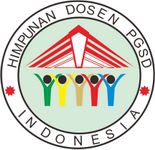Implementatıon Of Dıscovery Learnıng Wıth Gamıfıcatıon Concept To Improve 21st Century Skılls
DOI:
https://doi.org/10.31949/jee.v7i4.11929Abstract
This research is motivated by the difficulties experienced by most students in solving problems in learning, the
difficulty of working together because they do not want to share knowledge with each other, and lack of confidence
in presenting in front. One way to improve these skills is by implementing discovery learning. However,
discovery learning has a weakness in efficiency in managing learning so that it requires gamification as a
solution in managing learning. The purpose of this study is to improve 21st century skills in grade IV students
of SD Evans Indonesia Kota Bangun so that they can become a foundation of character so that they are ready to
face challenges in the 21st century. This research method is carried out qualitatively. The data collection and
analysis techniques are carried out using the Miles & Huberman model including (1) Data collection through
literature studies and observations; (2) Data reduction in the form of observation tables; (3) Data presentation
in the form of scripts; and (4) Drawing conclusions. The results of this study indicate that students can solve
problems in learning through critical and creative thinking skills, communicate and collaborate very well and
can present confidently in front of the class so that the application of discovery learning with the concept of
gamification can improve 21st century skills. These findings indicate that a fun and challenging learning
approach can encourage students to become learners to face the challenges of the 21st century.
Keywords:
Discovery Learning, Gamification, 21st Century SkillsDownloads
References
Aldalur, I., & Perez, A. (2023). Gamification and discovery learning: Motivating and involving students in the learning process. Heliyon, 9, e13135. https://doi.org/10.1016/j.heliyon.2023.e13135
Agustin, P., & Winanto, A. (2023). Efektivitas model discovery learning dan problem based learning dalam rangka peningkatan kemampuan literasi numerasi mapel IPAS Kelas IV SD. Jurnal Elementaria Edukasia, 6(2), 800-813. https://doi.org/10.31949/jee.v6i2.5471
Amalia, N., & Naya, N. A. (2023). Analisis dampak game online Mobile Legend terhadap sikap, pengetahuan, dan keterampilan peserta didik kelas V. Jurnal Elementaria Edukasia, 6(3), 1171-1179. https://doi.org/10.31949/jee.v6i3.6271
Brookhart, Susan M. (2010). How to Assess Higher-Order Thinking Skills in Your Classroom. sAlexandria: Association for Supervision & Curriculum Development.
Capatina, A., Juarez-Varon, D., Micu, A., & Micu, A. E. (2024). Leveling up in corporate training: Unveiling the power of gamification to enhance knowledge retention, knowledge sharing, and job performance. Journal of Innovation & Knowledge, 9, 100530. https://doi.org/10.1016/j.jik.2024.100530
Daryanto, & Karim, Syaiful. (2017). Pembelajaran Abad 21. Yogyakarta : Gava Media.
Fisher, Alec. (2009). Berpikir Kritis Sebuah Pengantar. Jakarta: Erlangga
Hartati, S. H., Koto, I. K., & Hambali, D. H. (2020). Penerapan Model Discovery Learning untuk Meningkatkan Kemampuan Berpikir Kritis dan Kecakapan Kerjasama pada Pembelajaran IPA Siswa Kelas V SD Negeri 32 Bengkulu Tengah. Jurnal Pembelajaran Dan Pengajaran Pendidikan Dasar, 3(2), 98–112. https://doi.org/10.33369/dikdas.v3i2.12330
Herman, T., Akbar, A., Farokhah, L., Febriandi, R., & ... (2024). Kecakapan Abad 21: Literasi Matematis, Berpikir Matematis, dan Berpikir Komputasi. books.google.com. https://books.google.com/books?hl=en&lr=&id=-i7vEAAAQBAJ&oi=fnd&pg=PA115&dq=%22yeni+dwi+kurino%22&ots=WbPQA_DKcE&sig=Hbp464bvlTGzfgXadGLb1Kz9hSY
Johnson, Elaine B. (2009). Contextual Teaching And Learning. (Edisi Terjemahan Ibnu Setiawan). Bandung: MLC
Kementerian Pendidikan dan Kebudayaan, Badan Pengembangan Sumber Daya Manusia Pendidikan dan Kebudayaan dan Penjaminan Mutu. (2013). Pendidikan tentang Model Pembelajaran Penemuan (Discovery Learning). Jakarta: Kementerian Pendidikan Nasional.
Kurino, Y. D., & Herman, T. (2023). Pengaruh Model Discovery Learning Terhadap Pemecahan Masalah Matematis Siswa Sekolah Dasar Berdasarkan hal tersebut , kegiatan belajar matematika mesti disajikan dalam menyapaikan suatu permasalahan , Sehingga proses kegiatan belajar matematika peserta di. 6(1), 181–186. https://doi.org/10.31949/jee.v6v1.4181
Martínez-Hita, M., Gómez-Carrasco, C. J., & Miralles-Martínez, P. (2021). The effects of a gamified project based on historical thinking on the academic performance of primary school children. Humanities and Social Sciences Communications, 8(1), 122. https://doi.org/10.1057/s41599-021-00796-9
Nastiti, F. E., & Ni’mal ’abdu Aghni Rizqi. (2020). Kajian: Kesiapan Pendidikan Indonesia Menghadapi Era Society 5.0. Edcomtech Jurnal Kajian Teknologi Pendidikan, 5(1), 61–66. https://doi.org/10.17977/um039v5i12020p061
Nathaniel, V. (2023). Penerapan Gamifikasi Pada Proses Belajar Matematika untuk Anak Sekolah Dasar Untuk Meningkatkan Motivasi Belajar Siswa. Jurnal ICTEE, 5 (2). https://doi.org/10.33365/jictee.v3i2.2300
Nauli, P., & Sinambela, J. M. (2013). Kurikulum 2013 dan Implementasinya dalam Pembelajaran. Jurnal Unimed, 6 (2)
Parhan, M. P. (2019). Kontekstualısası Materı Dalam Pembelajaran. Adi Widya: Jurnal Pendidikan Dasar, 3(1), 7. https://doi.org/10.25078/aw.v3i1.901
Park, S., & Kim, S. (2021). Is Sustainable Online Learning Possible with Gamification?—The Effect of Gamified Online Learning on Student Learning. Sustainability, 13(8), 4267. https://doi.org/10.3390/su13084267
Plantak Vukovac, D., Škara, M., & Hajdin, G. (2018). Korištenje i stavovi nastavnika o igrifikaciji u osnovnim i srednjim školama. Zbornik Veleučilišta u Rijeci, 6(1), 181–196. https://doi.org/10.31784/zvr.6.1.14
Redecker, Christine., Leis, Miriam., Leendertse, Matthijs., Punie, Yves., Gijsbers, Govert., Kirschner, Paul., Stoyanov, Slavi., & Hoogveld, Bert. (2011). The future of learning : preparing for change. Luxembourg: Publications Office of the European Union
Riyanto, Yatim. (2010). Paradigma Baru Pembelajaran. Jakarta: Kencana Prenada Media Group
Roberts, T. S. .(2004). Online Collaborative Learning : Theory And Practice. Pennsylvania: Information Science Publishing.
Septikasari, R., & Frasandy, R. N. (2018). Keterampilan 4c Abad 21 Dalam Pembelajaran Pendidikan Dasar. Tarbiyah Al-Awlad: Jurnal Kependidikan Islam Tingkat Dasar, 8(2), 107-117. https://doi.org/10.15548/alawlad.v8i2.1597
Stuart, K. (2010). 3D games enter a new generation. London: The Observer (19 September 2010).
Sugiyono. (2016). Metode Penelitian Kuantitatif, Kualitatif, dan R&D. Alfabeta
Sugiyono, (2018). Metode Penelitian Kualitatif untuk Penelitian yang Bersifat: Eksploratif, Enterpretif, Interaktif dan Konstruktif. Bandung: CV. Alfabeta.
Suratno. (2005). Pengembangan Kreativitas Anak Usia Dini. Jakarta: Depdiknas
Thorsett, P. (2021). Discovery Learning Theory A Primer for Discussion. Retrieved from http://limfabweb.weebly.com/uploads/1/4/2/3/14230608/bruner and discovery learning.pdf
Tri Mulyanto, I., Rita Fiantika, F., & Rachmadtullah, R., (2022). Kemampuan Berpikir Kritis Siswa Sd Pada Penerapan Model Discovery Learning. Nautical : Jurnal Ilmiah Multidisiplin, 1(1). https://doi.org/10.55904/nautical.v1i1.155
Van, Tiel Julia Maria. (2011). Pendidikan Anakku Terlambat Bicara. Jakarta: Perdana












